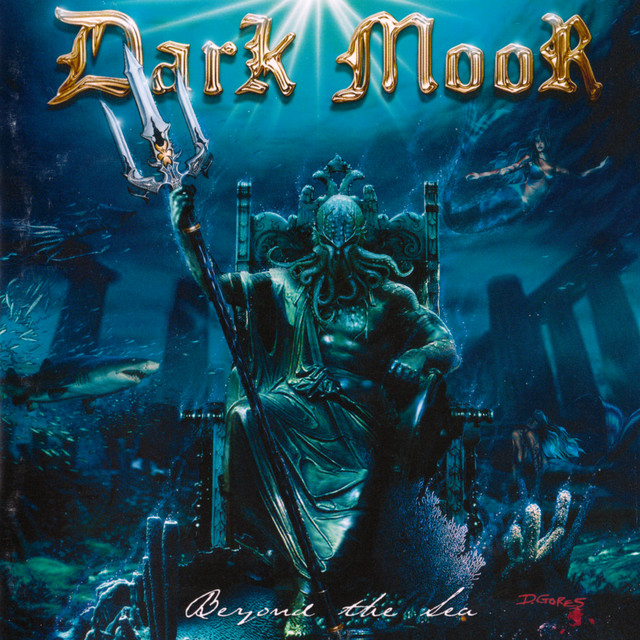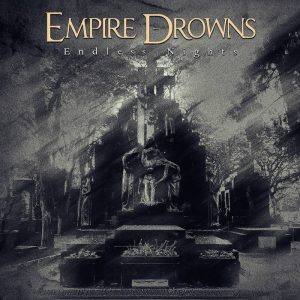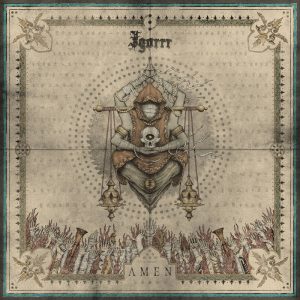PAR MARC DESGAGNÉ
Dark Moor a vu ses fans se diviser en deux depuis la grande séparation. Peu avant la sortie de l’album éponyme en 2003, Elisa C. Martín, Albert Maroto et Jorge Saez ont quitté la formation. L’arrivée du nouveau chanteur, Alfred Romero, a beaucoup fait parler dans la scène power metal. Pour « Beyond the Sea », Dark Moor se compose de Alfred Romero (chant), Andy C. (batterie), Daniel Fernández (basse) et Enrik García (guitare). Enrik étant le dernier membre original, de nombreux fans souhaitaient un changement de nom, et le passage d’une chanteuse à un chanteur n’a fait qu’accentuer ce désir. Personnellement, j’attendais « Beyond the Sea » avec impatience, ayant vraiment adoré l’aspect symphonique de l’album éponyme. Il était également intéressant de découvrir la performance d’Alfred Romero sur ce deuxième album, dont la voix, plutôt féminine, se mariait à merveille avec les airs du précédent opus.
Premièrement, il est certain que Dark Moor prouve encore une fois qu’ils sont en avance sur leur temps et qu’ils possèdent des musiciens incroyables avec cet album. Un power metal majestueux combinant des mélodies puissantes à un son moderne. Ils surpassent facilement les groupes standards, mais lorsqu’on dépasse une bonne partie des autres, il faut savoir être à la hauteur de ses œuvres passées. Le Dark Moor avec Elisa C. Martín et celui avec Alfred Romero sont deux formations réellement différentes. Il ne faut pas oublier que seul Enrik a participé aux cinq premiers albums. Entre les deux derniers albums du groupe, plusieurs changements ont eu lieu. Le bassiste Anan Kaddouri a quitté le groupe, remplacé par Daniel Fernández, et le batteur Andy C a rejoint la formation. Début 2004, le guitariste José Garrido a quitté le groupe pour se concentrer sur Arwen. Les trois premiers albums ont eu des membres stables et un son relativement similaire, tandis que pour les deux derniers disques, la formation a changé pour la majorité, ce qui se ressent au niveau musical. Sur « Beyond the Sea », nous découvrons un aspect plus agressif du nouveau Dark Moor, qui ne s’accorde pas entièrement avec les mélodies et le côté symphonique du groupe.
Une des grandes forces du groupe réside dans ses compositions. Sur l’album éponyme, ils nous avaient offert de superbes morceaux comme « The Bane Of Daninsky, The Werewolf », « Philip, The Second » et « Cyrano Of Bergerac ». Ils aiment partager des personnages ou des événements historiques. Sur « Beyond the Sea », nous avons également de belles pièces, telles que « Houdini’s The Great Escapade » et l’interlude « Julius Caesar ». Leur facilité à décrire l’histoire d’un personnage ou d’un événement est à découvrir en écoutant les deux derniers albums. Personnellement, « Cyrano Of Bergerac » de l’album précédent est un bijou, tant pour sa description du personnage que pour sa qualité musicale impressionnante. Sur « Beyond the Sea », ce point est un peu décevant, car les mélodies de ces morceaux sont moins accrocheuses.
J’avais adoré l’album éponyme avec Romero et j’attendais avec impatience ce nouvel album. Sans être complètement déçu, je dois avouer qu’il m’a moins accroché que le précédent. Certaines mélodies semblent déjà connues. C’est le cas de « Houdini’s The Great Escapade », qui présente un aspect plus agressif, personnellement moins en accord avec le son symphonique du groupe. On le remarque parfois sur l’album, et je n’ai pas vraiment apprécié cette attitude. Le tout ne se mélange pas toujours très bien. Néanmoins, « Beyond the Sea » offre de très bonnes chansons telles que « Before The Duel », « Miracles » et « Beyond The Sea ». De plus, ils nous offrent de magnifiques interludes avec « Through the Gates Of Silver Key » et « Julius Caesar ».
Cependant, il manque quelque chose à l’album ; bien qu’il y ait plusieurs bonnes pièces, rien ne semble vraiment extraordinaire ou au-dessus de leur propre standard. Toutefois, il plaira à ceux qui aiment les airs majestueux au clavier, les refrains entraînants et le son symphonique classique mélangé au power metal. Encore une fois, un disque qui pourrait servir de « point d’entrée » pour les personnes qui ne connaissent pas beaucoup le metal ou le power metal.
Bref, Dark Moor n’a pas à avoir honte de « Beyond the Sea », car il reste un très bon album, au-dessus de la moyenne. Alfred Romero et ses collègues n’ont peut-être pas surpassé l’album précédent, mais cet opus mélodique devrait tout de même plaire aux amateurs du « nouveau Dark Moor ».
PAR MARC DESGAGNÉ
https://www.facebook.com/official.darkmoor
https://www.instagram.com/darkmoorofficial
ENGLISH version
Dark Moor has seen its fans split in two since the major lineup change. Shortly before the release of their self-titled album in 2003, Elisa C. Martín, Albert Maroto, and Jorge Saez left the band. The arrival of the new vocalist, Alfred Romero, sparked a lot of discussion in the power metal scene. For « Beyond the Sea, » Dark Moor is composed of Alfred Romero (vocals), Andy C. (drums), Daniel Fernández (bass), and Enrik García (guitar). Enrik being the last original member, many fans wanted a name change, and the shift from a female to a male singer only intensified this desire. Personally, I was eagerly anticipating « Beyond the Sea, » having really enjoyed the symphonic aspect of the self-titled album. It was also interesting to see Alfred Romero’s performance on this second album, as his rather feminine voice blended beautifully with the previous album’s tracks.
Firstly, one thing is certain with this album: Dark Moor proves once again that they are ahead of their time and have incredible musicians. A majestic power metal album combining powerful classical melodies with a modern sound. They easily surpass standard bands, but when you surpass many others, you must be able to live up to your past works. The Dark Moor with Elisa C. Martín and the one with Alfred Romero are two distinctly different formations. It should be noted that only Enrik participated in all five previous albums. Between the last two albums, there have been several changes. Bassist Anan Kaddouri left the band, replaced by Daniel Fernández, and drummer Andy C joined. In early 2004, guitarist José Garrido left to focus on Arwen. The first three albums had stable members and a relatively similar sound, but for the last two albums, the lineup changed significantly, which is noticeable musically. On « Beyond the Sea, » we face a more often aggressive side of the new Dark Moor, which doesn’t fully align with the band’s melodic and symphonic elements.
One of the great strengths of the band lies in their compositions. On the self-titled album, they offered us superb tracks like « The Bane Of Daninsky, The Werewolf, » « Philip, The Second, » and « Cyrano Of Bergerac. » They enjoy sharing stories of characters or historical events. On « Beyond the Sea, » we also have some nice pieces, such as « Houdini’s The Great Escapade » and the interlude « Julius Caesar. » Their ability to describe the story of a character or event is worth discovering in the two latest albums. Personally, « Cyrano Of Bergerac » from the previous album is a gem, both for its portrayal of the character and its impressive musical quality. On « Beyond the Sea, » this aspect is somewhat lacking, as the melodies in these tracks are less catchy.
I had loved the self-titled album with Romero and was eagerly anticipating this new album. While not completely disappointed, I must admit that it didn’t captivate me as much as the previous one. Some melodies give a sense of déjà vu. This is the case with « Houdini’s The Great Escapade, » which also has a more aggressive aspect that, personally, doesn’t blend well with the band’s symphonic sound. This is noticeable several times on the album, and I didn’t really enjoy this approach. The mix doesn’t always come together well. Nonetheless, « Beyond the Sea » offers its share of very good songs, such as « Before The Duel, » « Miracles, » and « Beyond The Sea. » Additionally, they provide beautiful interludes with « Through the Gates Of Silver Key » and « Julius Caesar. »
However, the album seems to be missing something; while there are several good tracks, nothing seems truly extraordinary or beyond their own standard. Nevertheless, it will appeal to those who enjoy majestic keyboard passages, catchy choruses, and the classical symphonic sound mixed with power metal. Once again, this is an album that could serve as a « gateway » for people who are not very familiar with metal or power metal.
In summary, Dark Moor has nothing to be ashamed of with « Beyond the Sea, » as it remains a very good album, above average. Alfred Romero and his colleagues may not have surpassed the previous album in general, but this melodic opus should still be appreciated by fans of the « new Dark Moor. »














